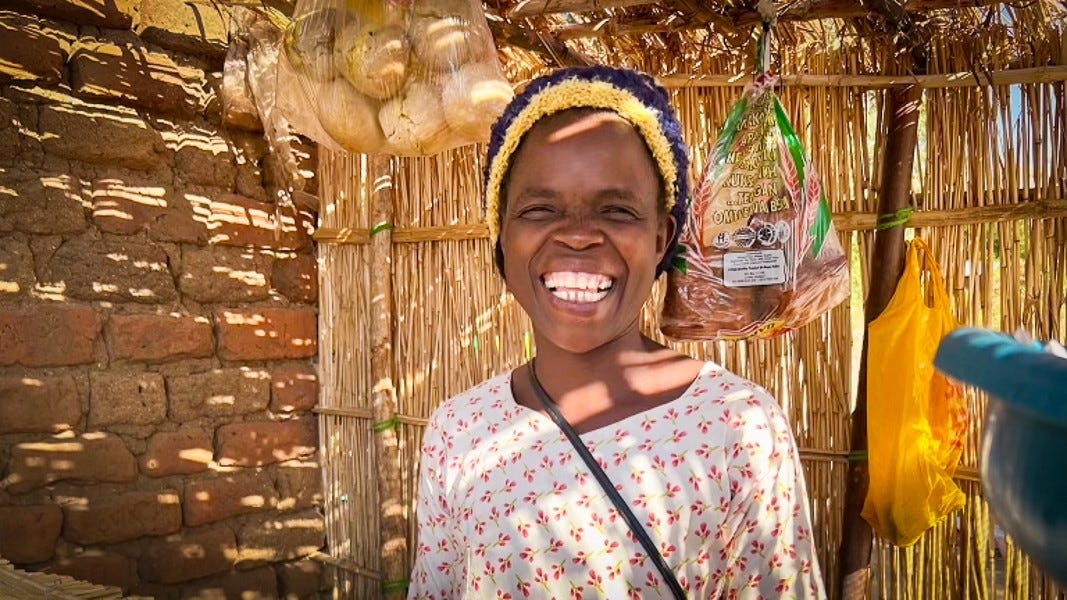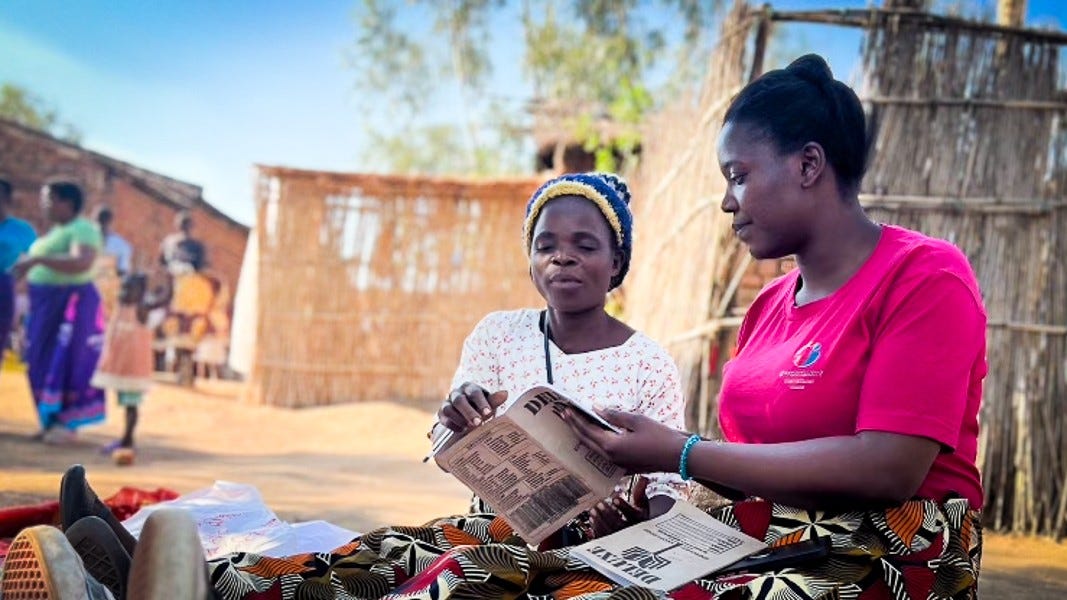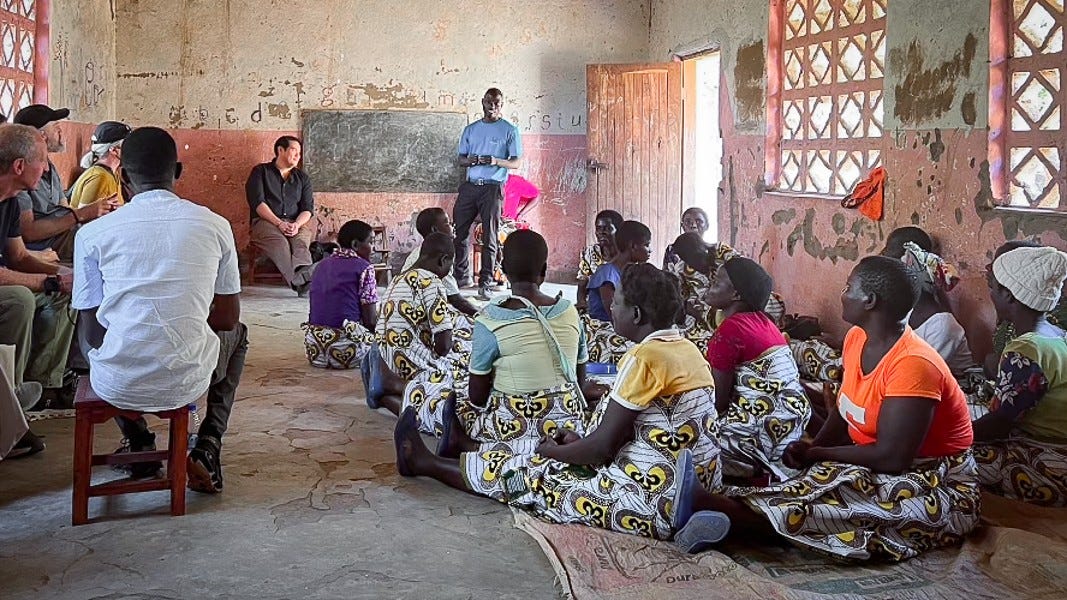Week 24.30 Leadership Ripple
We've got more power to create positive change than we realize - so let's use it!
My recent Kilimanjaro climb was only the first mountain. This week, I was in Malawi for the second mountain - witnessing the transformative power of Opportunity International's (OI) aptly named program, The Rise. Our team of 8 climbers collectively raised $180,000 for this initiative, which addresses the complex cycle of extreme poverty by empowering women and families through access to capital, skills training, and education. We observed families starting dual businesses - often raising goats alongside running small grocery stores from their homes. They also participate in Village Savings and Loan Associations (VSLAs), simplified credit unions where members save and loan money to one another. With weekly support from caseworkers, these women do the hard work each day to create a better life for themselves and their families. Their joy, determination, and agency are inspiring, showcasing the far-reaching impact that one person can have on their family, community, and society. Observing the impact that OI has on these women, and the impact the women have on the people around them, I saw the leadership ripple in action.
The Power of Agency: When women enter The Rise program, many lack confidence and struggle to make eye contact due to their low economic and social standing. However, after a few months, a remarkable change occurs. They discover their innate agency, realizing they can create businesses, leverage their knowledge and skills to provide for their families, and build a better life through patience and hard work. Their pride in showing us their businesses and home improvements was palpable. I recalled my leadership transformation and how the belief of others in me served as a catalyst for me to believe in myself. When we believe in our employees, they step up to the challenge. True leadership is found in empowering others to recognize and utilize their own agency.
Individual to Family Impact: The effects of empowerment through The Rise program ripple outward, starting with the individual and expanding to her family. Improved nutrition, hygiene, and education for children become possible. As one participant shared, "We now have the ability to pay the school fees for my children, and they are able to focus at school because they are eating three meals a day and are clean." Notably, many women reported significant improvements in their marriages, with increased respect from their husbands and more collaborative decision-making. Leadership often starts at home, and more than ever work and life are integrated. Effective leaders understand that personal growth and empowerment can positively impact entire family units, and they encourage them to show up in their fullness.
Connection with Community and Society: As families stabilize and prosper, their ability to contribute to their community grows. This manifests not just in economic terms but in shifting social dynamics. Women who were once marginalized find themselves becoming valued community members and even local entrepreneurs. One participant noted, "The people who used to laugh at me are now my customers." Another shared, "I did not have any friends before, and no one came to my house. Now, I have many friends and am invited to community events." Leaders should recognize how interconnected we all are and the far-reaching ripple effect of our actions and choices. When I hold this idea in my mind and heart, my leadership improves and the best course of action becomes clear. We are more powerful than we think.
The stories of these remarkable women in Malawi offer profound lessons for life and leadership. They remind us of the transformative power of belief - in ourselves and in others. They demonstrate how small, consistent actions can lead to significant change and how empowerment at an individual level can catalyze broader shifts. When we give those we love and lead the power of agency, we give them the ability to rise beyond their expectations. When they rise beyond their expectations, they lift all boats and bring a spirit of community and collective success to their teams. And when teams thrive the entire organization breathes to a new rhythm. I have seen with my own eyes the powerful ripple effect of individual agency to team cohesion to societal transformation, and it gives me even more hope for leaders large and small to create more flourishing.
With love, gratitude and wonder.
Jacquelyn
This article explores the valuable lessons we can learn from bad bosses, offering a fresh perspective on negative work experiences. The author argues that while it's easy to be inspired by great managers, difficult bosses can also shape our leadership style and professional development. By reframing these challenging experiences as opportunities for growth, we can extract meaningful insights and improve our own management approach.
The piece is particularly interesting because it challenges the conventional wisdom of simply avoiding negative behaviors. Instead, it encourages readers to transform these experiences into positive, actionable goals. This approach not only helps individuals become better leaders but also promotes a more constructive mindset when dealing with workplace challenges. The article's blend of personal anecdotes, practical advice, and scientific insights makes it a compelling read for anyone looking to grow professionally, regardless of their career stage.
The 5/5/5 Method: How The World’s Best Teams Get Smarter In 15-Minute Sprints by Keith Ferrazzi
This article discusses the concept of "Teamship" and introduces the 5/5/5 Learning Roadmap as a powerful tool for professional development in modern organizations. It emphasizes the importance of continuous learning and adaptation in today's fast-paced business environment, highlighting that even top executives need to improve their skills regularly to keep up with change.
The 5/5/5 Learning Roadmap is presented as a structured, peer-driven approach to professional development that leverages collective wisdom and accountability within teams. This method involves brief presentations, question sessions, and feedback rounds among team members, fostering a culture of continuous improvement and growth. The article argues that this approach can transform organizations by creating a learning-oriented culture, improving adaptability, and driving innovation across various industries.
More than money – how do you design incentive systems that drive behavior? by Rita McGrath
This article explores the intricacies of effective reward systems in organizations, drawing insights from Steve Kerr's expertise. It emphasizes the importance of defining clear goals and understanding the factors that influence the power of rewards. The piece outlines key elements such as eligibility, visibility, sensitivity, timeliness, certainty, reversibility, strategic alignment, and measurability. These factors contribute to creating a more impactful and motivating reward system that can drive desired behaviors and performance.
What makes this article particularly interesting is its practical approach to rethinking reward systems beyond monetary incentives. It challenges readers to consider a broader range of rewards and provides a framework for evaluating their effectiveness. The article's emphasis on aligning rewards with organizational strategy and making them measurable and controllable for employees offers valuable insights for leaders looking to enhance motivation and performance in their teams. By encouraging a more thoughtful and comprehensive approach to rewards, the article provides a fresh perspective on a critical aspect of organizational management.















